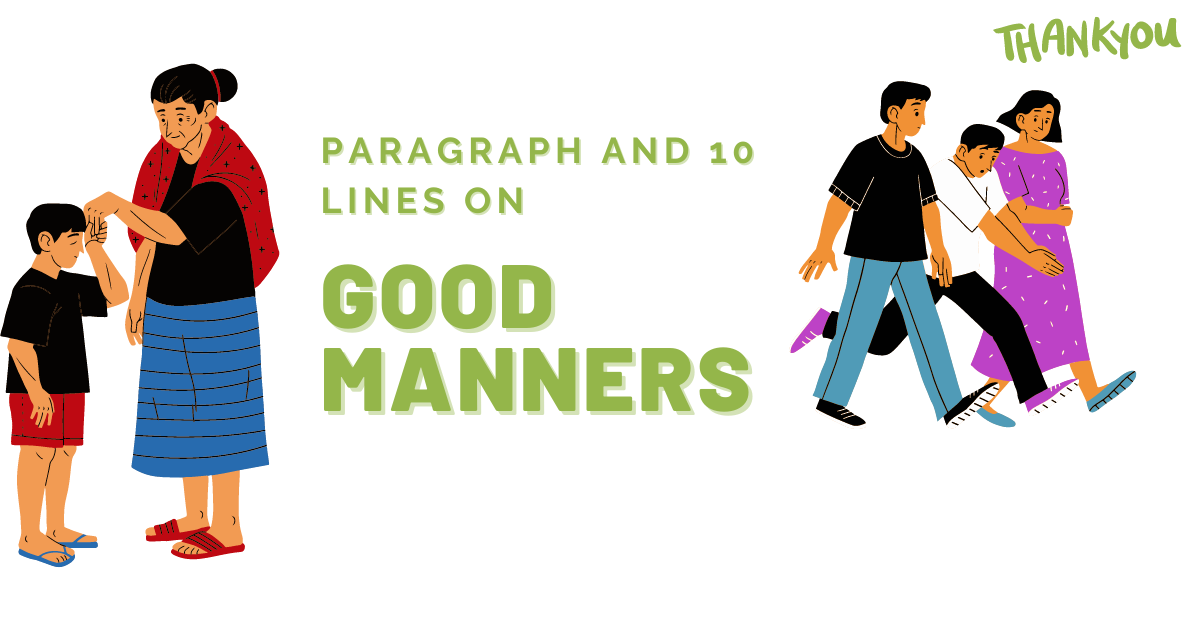Paragraph on Good Manners in 100 Words
Good manners are an essential aspect of our social interactions and a reflection of our personality. They are a set of behaviours that demonstrate respect, courtesy, and consideration towards others. Good manners include things like saying “please” and “thank you,” using polite language, showing consideration for others’ time, being punctual, and practising good hygiene. Good manners also involve listening attentively when others speak and not interrupting them. Furthermore, it is critical to respect people’s differences and avoid making derogatory remarks or jokes. In short, good manners help us to form positive relationships with others, make a good impression, and make social interactions more enjoyable for everyone involved.
“Good manners will open doors that the best education cannot.” – Clarence Thomas
Paragraph on Good Manners in 150 Words
Good manners are an integral part of our daily interactions and an essential aspect of our personality. They are a set of behaviours that show respect, courtesy, and consideration towards others. Good manners involve basic things like saying “please” and “thank you,” using polite language, showing consideration for others’ time, being punctual, and practising good hygiene. In addition, they include behaviours like listening attentively when others speak, not interrupting them, and being mindful of people’s personal space. Respecting differences, avoiding derogatory comments or jokes, and refraining from using foul language are all examples of good manners. Also Read 30 Good Manners Kids Must Know before 10
Furthermore, good manners play an important role in developing positive relationships with others, making a positive impression, and making social interactions more enjoyable for everyone involved. Good manners can also help you develop self-confidence by demonstrating respect and empathy for others. To summarise, good manners are an important aspect of our behaviour that not only benefits others but also helps us become more empathetic, respectful, and confident individuals.
“Manners are a way of showing other people we care about them.” – Mary Killen
10 Lines on Good Manners
- Good manners are a set of social behaviours that reflect respect, courtesy, and consideration towards others.
- Saying “please” and “thank you” is a fundamental aspect of good manners.
- Good manners also involve using polite language, showing consideration for others’ time, and being punctual.
- Listening attentively when others speak and not interrupting them are important aspects of good manners.
- Practising good hygiene and showing respect for people’s personal space is also essential.
- Good manners involve being mindful of people’s feelings and avoiding making derogatory comments or jokes.
- Respecting differences and refraining from using foul language is also part of good manners.
- Good manners help in building positive relationships with others and creating a positive impression.
- They are important in both personal and professional settings.
- Good manners help in developing empathy, respect, and confidence in individuals.
“Good manners and kindness are always in fashion.” – Marsha Doble
FAQs on Good Manners
Q. What are good manners?
A. Good manners are a set of behaviours that demonstrate respect, courtesy, and consideration towards others. They involve basic things like saying “please” and “thank you,” using polite language, showing consideration for others’ time, and being punctual.
Q. Why are good manners important?
A. Good manners play an essential role in building positive relationships with others, creating a positive impression, and making social interactions more pleasant for everyone involved. They are important in both personal and professional settings and can help in developing empathy, respect, and confidence in individuals.
Q. How can I teach my child good manners?
A. You can teach your child good manners by modelling good behaviour yourself, praising good manners when you see them, correcting bad behaviour in a gentle and positive way, and making sure to reinforce good manners consistently. It is important to be patient and consistent with your child as they learn and develop their social skills.
Also Read 30 Good Manners Kids Must Know before 10
Q. What are some examples of good manners in the workplace?
A. Good manners in the workplace include things like showing up on time for meetings, being respectful and courteous towards colleagues, avoiding gossip and negative comments, using appropriate language, and being mindful of personal space and hygiene.
Q. Can good manners vary from culture to culture?
A. Yes, good manners can vary from culture to culture, and it is important to be aware of cultural differences and customs when interacting with people from different backgrounds. However, there are some universal principles of good manners that are respected across all cultures, such as showing respect and consideration towards others.
“Politeness is the flower of humanity.” – Joseph Joubert

